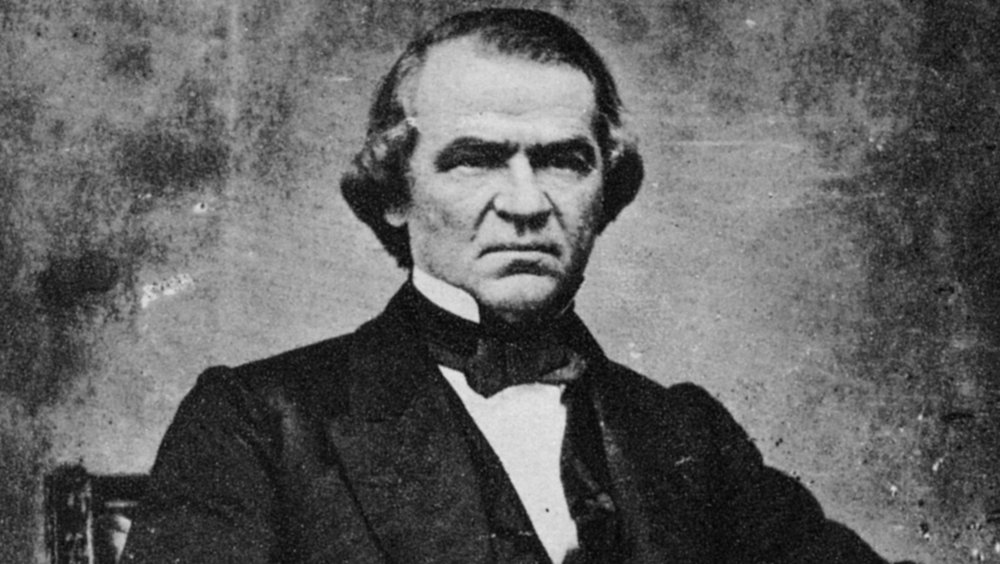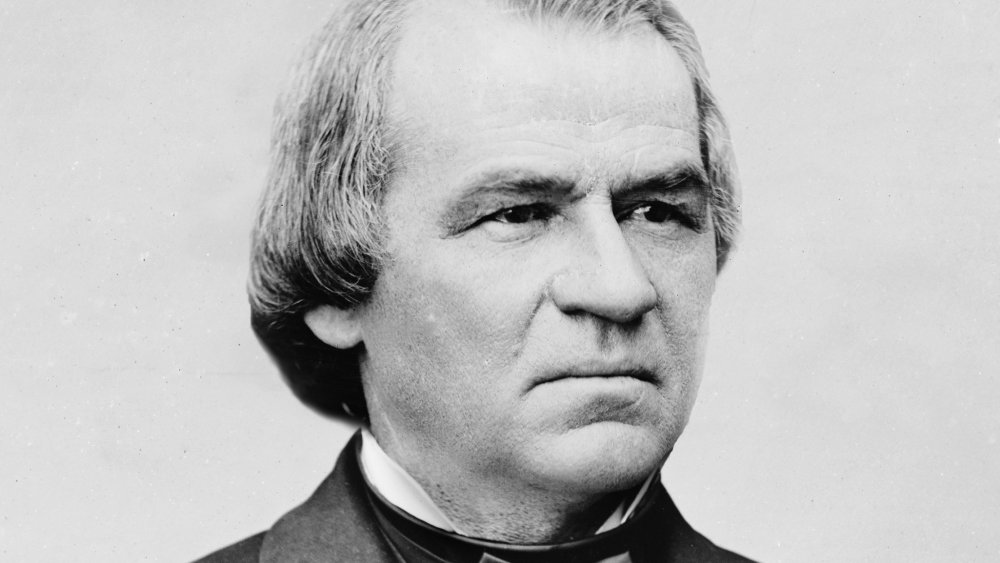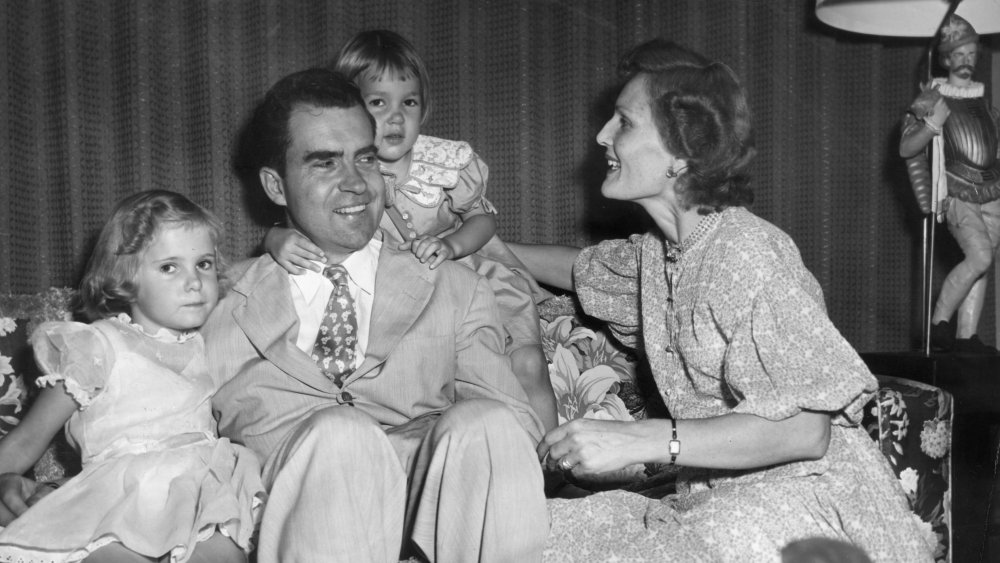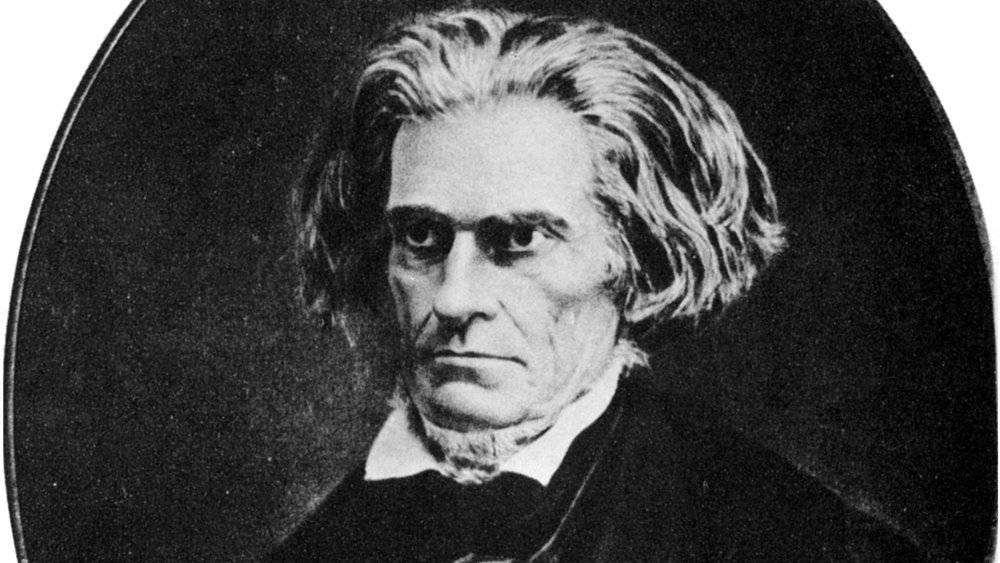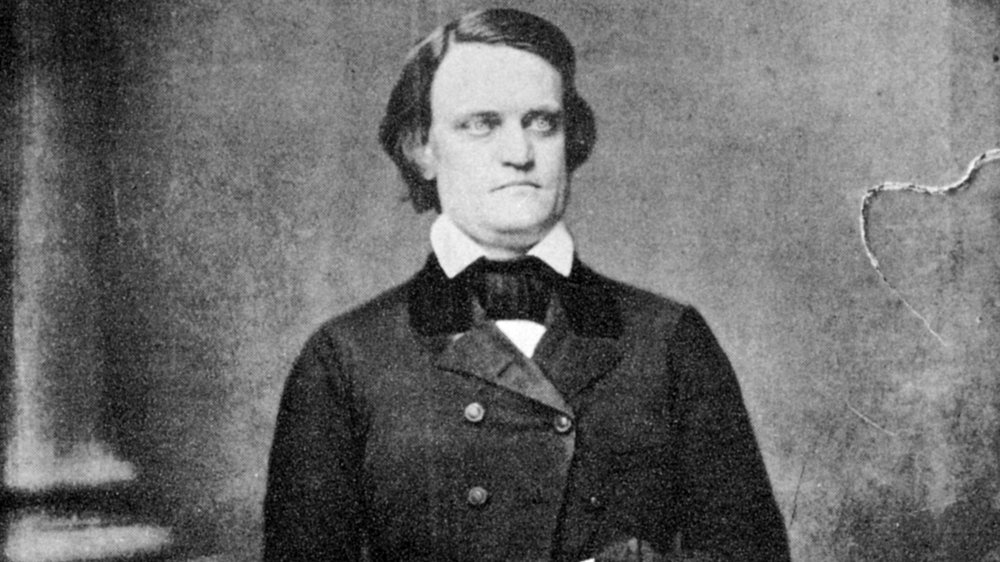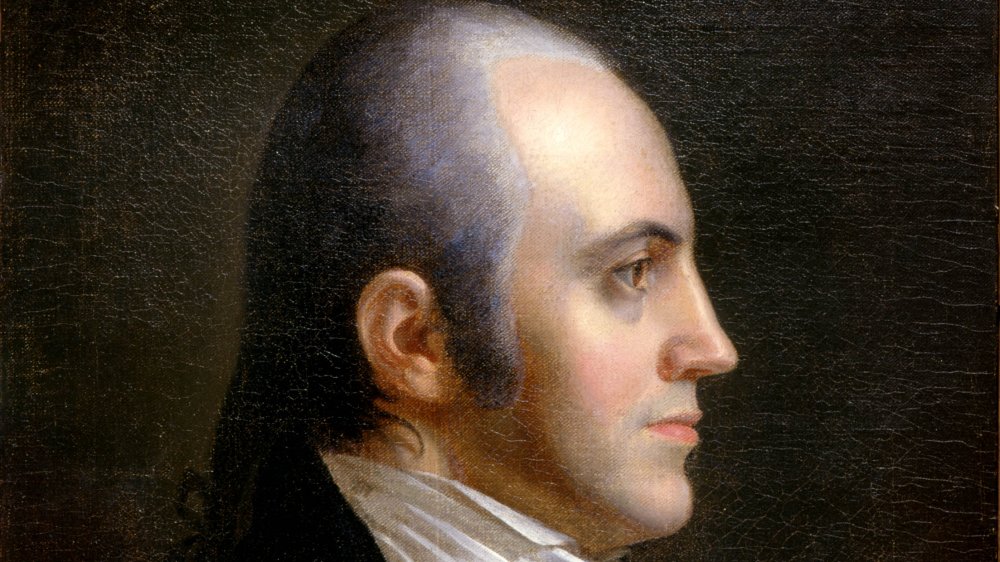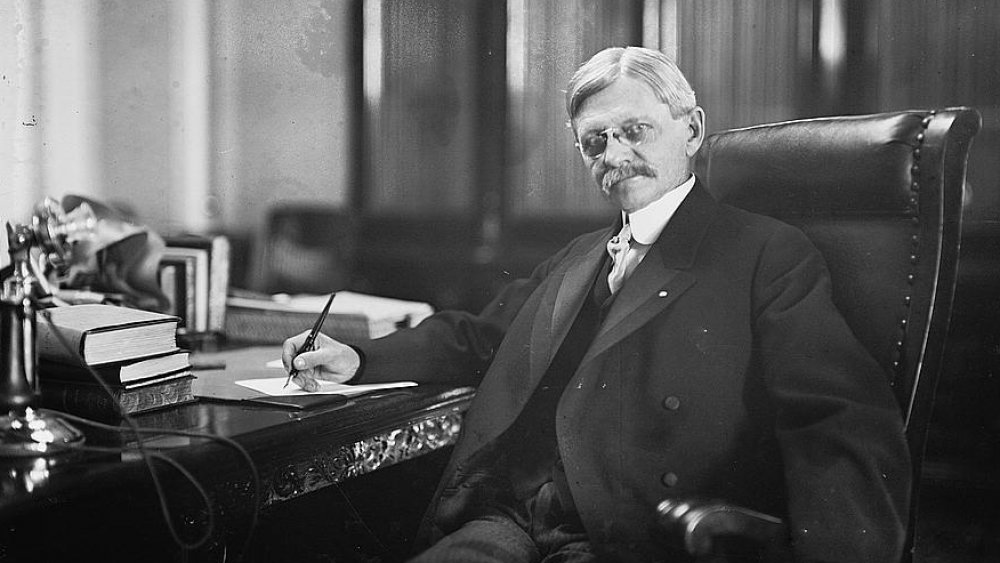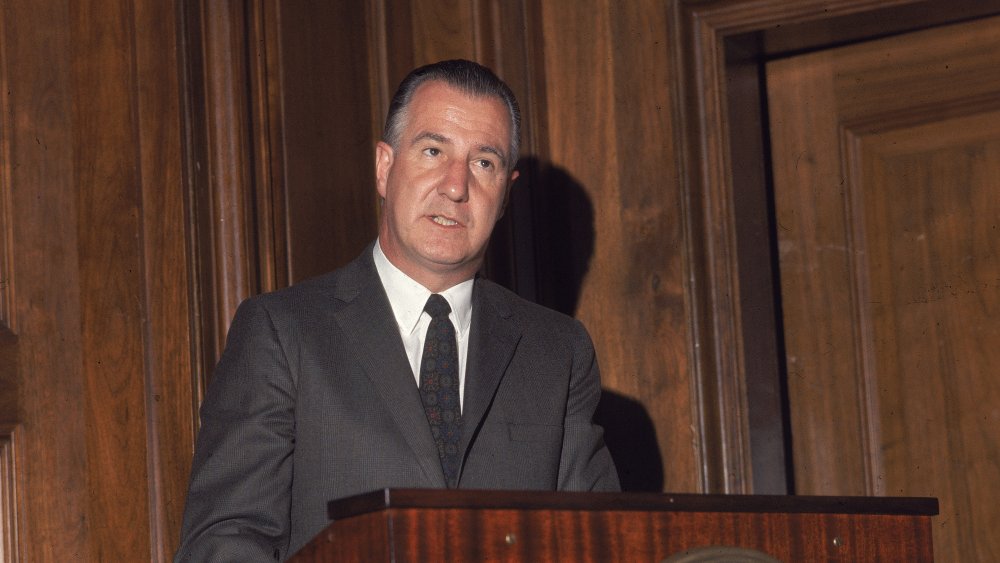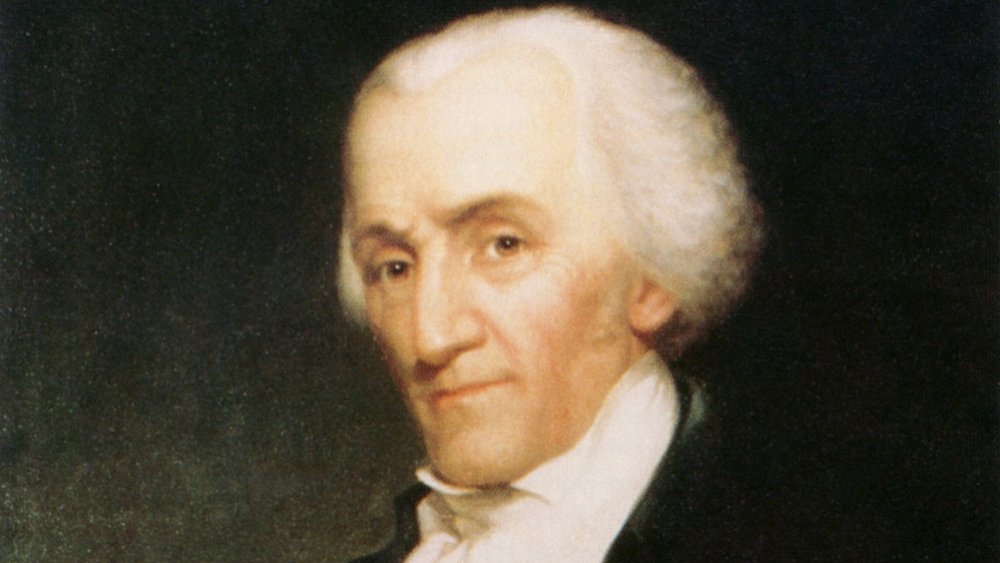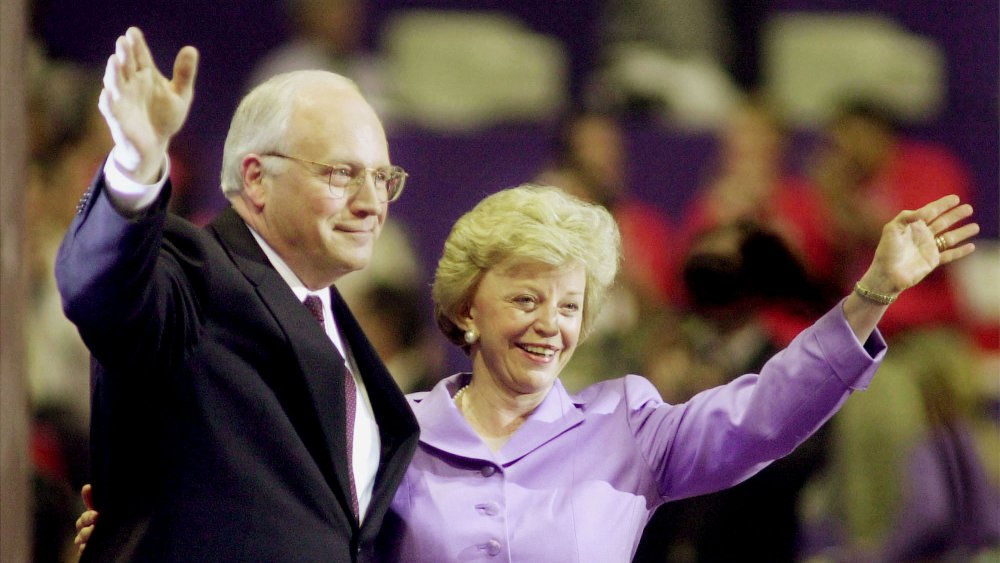The Worst Vice Presidents In American History
As listed by Britannica, out of the 48 vice presidents throughout U.S. history, 14 eventually become the president, though, as of this writing, the number could increase to 15 with a Joe Biden election victory. The vice president of the United States of America is one of the most powerful individuals in the world. At the same time, it is a position that's usually only in the public eye when a presidential candidate is selecting someone to hold the position when they run for office. On the rare occasions when a president can no longer continue their term, or when the Senate needs a tie-breaking vote, the name of the vice president takes center stage once again. Aside from that, the vice president has been a traditionally quiet position, with a few exceptions.
Sometimes, being quiet is good. Just like how not every president in the nation's history had productive administrations, the same goes for their vice presidents. Either from incompetence, corruption, not committing the time and effort required for the position, or a combination of the three plus more troubling qualities, certain vice presidents would have done better staying away from Pennsylvania Avenue. And, of course, some of these veeps found themselves promoted to the highest office in the world and failing just as much as they did as vice presidents. These are the worst vice presidents in the history of the United States.
Andrew Johnson
According to the U.S. Senate, Andrew Johnson was "an independent thinker" throughout his early political career. He was popular among working-class voters and hated by Southern elites. As a senator, he bucked his state of Tennessee during secession by declaring his loyalty to the Union, endearing him to President Abraham Lincoln, who named him the military governor of Tennessee during the Civil War.
By the 1864 election, the Union's victory over the Confederacy was clear, and President Lincoln wished to have a running mate from the South to mend the wounds of the war and reunite the country. Johnson was a Southerner loyal to the Union, making him the perfect candidate. Lincoln's assassination in April 1865 ended Andrew Johnson's vice presidency and pushed him to the forefront of healing the divided nation.
Johnson's presidency was so tumultuous that he became the first U.S. president to be impeached. According to the Constitution Center, Johnson held sympathies for the former Confederacy and wanted quick and lenient forgiveness. This included allowing former Confederate states the ability to control voting rights and strongly opposing the 14th Amendment. Both platforms went against the wishes of his Republican-led Congress. Johnson wrote, "This is a country for white men, and by God, as long as I am President, it shall be a government for white men," in 1866.
A 2017 poll by C-SPAN ranked Johnson as the second-worst commander-in-chief in U.S. history.
Richard Nixon
Prior to Watergate, COINTELPRO, and the Pentagon Papers during his presidency in the 1970s, Vice President Richard Nixon had his fair share of controversies in the Oval Office during the 1950s. Paired with decorated war hero Dwight Eisenhower, Nixon almost didn't even make it to the White House as Eisenhower's second. During the 1952 presidential campaign, The New York Times reports, evidence emerged that Nixon had a secret money fund for his own use, and Eisenhower considered giving him the boot.
Nixon survived the scandal by addressing it head-on. In what is now known as the "Checkers Speech," he admitted to taking $18,000 from supporters, though he denied ever using the money for personal purposes and denied the existence of a secret fund. During the speech, he admitted that his dog, Checkers, was also a political gift. The speech was met with positive feedback, and Nixon stayed on Eisenhower's ticket. During his tenure as vice president, Nixon focused on international policies. He made a contentious tour of Venezuela, which saw stones being thrown at his motorcade, and famously traded words with Soviet premier Nikita Khrushchev, according to the Miller Center.
U.S. News & World Report states that Nixon wanted President Eisenhower to intervene more when Indo-China sought to overthrow their French colonizers. By the time Nixon made it to the White House in the late 1960s, the French/Indo-China conflict had exploded into the intense quagmire of the Vietnam War.
John C. Calhoun
If the name "John C. Calhoun" sounds familiar, he was in the news recently as the city of Charleston removed his statue from Marion Square, and at this period of time, there is only one reason why someone's statue is taken down. The Post and Courier spoke to Charleston mayor John Tecklenburg about the removal, and he said this: "The intellectual underpinnings of slavery and white supremacy came from this man. So there's a sense of relief — relief for the generations of Charlestonians who had these personal stories about the impact of Mr. Calhoun being here."
Calhoun's legacy is as one of the most ardent supporters of the institution of slavery, and it was Calhoun's ideology that, a decade after his death, pushed the South to secede from the country and begin the American Civil War. During his vice presidency, as described by Britannica, Calhoun publicly espoused nullification, the theory that states could nullify or invalidate federal decisions. He also argued, according to HistoryNet, that slavery benefitted all parties involved, including the slaves themselves.
A big personality, Calhoun held the vice president position for two different administrations: first with John Quincy Adams and then during the first term of Andrew Jackson. A White House that featured two dynamic personalities like Calhoun and Jackson could not last, and Calhoun resigned after Jackson's first term and spent the rest of his life in the Senate continuing to fight against any efforts for abolition.
John C. Breckinridge
Speaking of vice presidents who supported the institution of slavery, we have Kentucky's not-so-proud son John Cabell Breckinridge. In 1857, Breckinridge became the youngest vice president in U.S. history at 36 years old. After four years under President James Buchanan, Breckinridge finished second in the 1860 election to Abraham Lincoln and then proceeded to fight for the Confederacy in the Civil War, going from the second-most-powerful position in the country to taking up arms against that same country in less than a year.
Breckinridge's political career began, in part, because of the popularity he earned while serving as a soldier in the Mexican-American War. At 28, he was voted to Kentucky's House of Representatives. According to the U.S. Senate, Breckinridge was seen as a moderate, as he was both pro-slavery and for the Union. In 1854, he and Senator Stephen Douglas successfully pushed the Kansas-Nebraska Act, which left slavery a state issue based on popular sovereignty.
At the 1856 Democratic Convention, the three leading candidates sought the popular Breckinridge's endorsement. He originally gave it to Douglas but eventually backed James Buchanan. Breckinridge ended up nominated as vice president, and the pair won the election. However, according to National Endowment for the Humanities, Buchanan distrusted Breckinridge for his original endorsement of Douglas and rarely consulted him on any policy. When he passed the deciding vote in the Senate against the Homestead Act, the Senate reorganized and passed the bill against President Buchanan's veto. Breckinridge's best days were behind him before he even hit 40 years old.
Aaron Burr
Surprised to see Aaron Burr, sir? He shot a fellow Founding Father. His bids for political power failed, and his relationship with Alexander Hamilton wasn't the only one that soured. Burr towers historically for all the wrong reasons: dueling, corruption, and accusations of treason. Putting this heathen here is an easy choice. Now, let the rapping end and the analysis begin.
According to History, Burr held very progressive views. He fought to defend the free press and for abolition, defended the rights of immigrants, and introduced a bill for women's suffrage. According to US History.org, in 1791, Burr defeated Alexander Hamilton's father-in-law, Philip Schuyler, in a senatorial election. Hamilton and Thomas Jefferson, both in the cabinet of George Washington, looked down on Burr as someone who was not loyal to any ideology, with Hamilton's anger against Burr heightened because of his father-in-law's defeat.
Hamilton would frequently speak out against Burr publicly, which Burr believed contributed to him losing the 1800 presidential election to Thomas Jefferson as well as the 1804 New York gubernatorial election. The defeats led Burr and Hamilton to duel in 1804, and Burr fatally wounded Hamilton. The duel tarnished Burr's legacy, and he quickly went into exile. Jefferson was more than happy to rid himself of his former vice president. Looking at the new Louisiana Territory, Burr hoped to build a new nation from the land, for which he was arrested for treason in 1807. While he was acquitted, Burr's legacy was far beyond repair.
Dan Quayle
"Senator, you're no Jack Kennedy." The receiving end of that humiliating rebuke isn't a good place to be during a vice presidential debate. In the 1988 debate between Republican Dan Quayle and Democrat Lloyd Bentsen, Bentsen took exception to Quayle making a comparison between himself and the late JFK. This clap-back would forever be immortalized and was just one of many embarrassments that Vice President Quayle would suffer during his tenure.
Quayle's four years as vice president were a continuous series of speaking errors. The U.S. Senate reports that George H.W. Bush wanted to keep the announcement of Quayle as his vice presidential pick a surprise. At the event in which he would make the announcement to a crowd of people, Bush, arriving by boat, had trouble spotting Quayle and his wife. Quayle said, "This was not the best-planned episode in political history." All the same, Bush won the 1988 presidential election, and Quayle ended up in the White House. Provided by Live About, here are just a few words of wisdom from Vice President Quayle: "One word sums up probably the responsibility of any vice president, and that one word is 'to be prepared.'" "I have made good judgments in the past. I have made good judgments in the future."
During the 1992 election, Quayle attempted to bring "traditional family values" by attacking the television show Murphy Brown and, while campaigning in an elementary school, misspelled the word "potato." Both became immortal gaffes for the one-term veep.
Thomas Marshall
Thomas Marshall had very little, if any, impact on U.S. politics. According to the Miller Center, not even his own president, Woodrow Wilson, enjoyed his presence.
According to Time, Marshall and Wilson's relationship was "one of functioning animosity." After his first session, Marshall stopped attending cabinet meetings and sought to find an office where he could smoke and relax. This contrasted with the stern, stoic Wilson. When Wilson departed for Europe at the end of World War I to meet with the leaders of the Allied powers, he left Marshall in charge of the nation, to which Marshall said he would not be responsible for anything that happened while Wilson was in Europe.
Marshall was the lazy high schooler of vice presidents, enjoying his benefits but ignoring his actual responsibilities. In October 1919, Woodrow Wilson was left almost completely incapacitated after suffering a stroke. Despite this, Marshall remained absent from meetings and refused to step up his role in the administration. Wilson's wife, Edith Bolling Galt Wilson, became the de-facto president of the United States during the final year of the Wilson administration.
Spiro Agnew
According to History, Spiro Agnew became the second person to resign from the vice president position, with the first being John C. Calhoun in 1832. Agnew's resignation came following a Department of Justice investigation (unsurprising for a member of the Nixon Administration). The same day he resigned, Agnew pleaded no contest to federal income tax evasion.
When Agnew was selected by Nixon as his running mate for the 1968 election, as The Atlantic states, Nixon felt he was getting the best of both worlds. Agnew was a moderate Republican who was both "tough on crime" and a supporter of the Civil Rights Movement. Four years later, when it was reelection time, Nixon desperately wanted to dump Agnew, but because of Agnew's popularity with the hardline conservative faction of the party, Nixon kept him. History Today reports that when asked about why he kept Agnew, Nixon responded, "Because no assassin in their right mind would kill me."
Nixon had grown angry that Agnew hadn't taken the office seriously and hadn't performed the necessary duties that Nixon himself had during his eight years as Dwight Eisenhower's vice president. In 1971, Agnew took a trip to Africa that went awry, as he spent much of the trip doing leisure activities. Privately, Nixon lamented about the trip, saying, "You've got to make it appear that the trip's for work. Not over there on a godd*mn vacation."
Elbridge Gerry
Elbridge Gerry's early life in politics would not have put him on this list. According to the University of Groningen, Gerry became an ally to soldiers during the Revolutionary War, earning the nickname "soldiers' friend" for advocating for better pay and equipment. During the British march to Lexington and Concord, Gerry was almost captured by British troops.
After the war, however, Gerry seemed to show contempt for the American public's ability to democratically elect their own leaders. According to Smithsonian Magazine, Gerry argued against direct elections for members of the House of Representatives and refused to sign the Constitution, saying, "as complete an aristocracy as ever was framed." He feared that a standing army and a powerful Senate could lead to tyrannical rule. Despite this, he was seen still as admirable to many congressmen, such as John Adams. During Adams' presidency, he sent Gerry, John Marshall, and Charles Cotesworth Pinckney to France in an attempt to restore harmony between the nations. According to History, the plans failed, a Quasi-War between the nations erupted, and the incident became known as the XYZ Affair.
Gerry's lasting legacy to this day comes from the controversial political strategy that bears his name. As governor of Massachusetts in 1812, not long before he became James Madison's vice president, Gerry approved a redrawn voting map that benefited his Democratic-Republican Party. The term "gerrymandering" was coined: The Boston Gazette illustrated a political cartoon calling the map "gerrymander" since it was shaped like a salamander.
Dick Cheney
Dick Cheney might be the most consequential vice president in U.S. history. While most veeps tend to take a backseat to their president, Cheney shared the spotlight with President George Bush, sometimes even headlining, and is credited for helping to reshape the office. However, Cheney's list of misdeeds is enough to fill multiple anthologies, and that's before he shot his friend in the face.
When Cheney was named the running mate of George W. Bush in 2000, after serving Bush's father as secretary of defense in the early '90s and as the chairman and chief executive officer of the Halliburton Company, per Britannica, many did not believe Cheney would stay the candidate. Already mired with heart troubles, Cheney suffered a mild heart attack two weeks after Election Day. Still, Cheney persisted. According to the U.S. Senate, Bush put Cheney in charge of filling up cabinet positions. After securing the White House in the Bush v. Gore decision, Bush told Republican senators that Cheney was his voice. At the time, the Senate was split 50/50 between parties, meaning Cheney would have the deciding vote in the event of a tie.
After the September 11th attacks, Cheney was influential in shaping the Bush administration's Middle East policy. Cheney helped shaped the narrative that Iraq's leader, Saddam Hussein, had weapons of mass destruction, which led the U.S. to invade and topple Hussein. However, when no weapons were found and Halliburton was given lucrative government contracts, people accused Cheney of cronyism.
